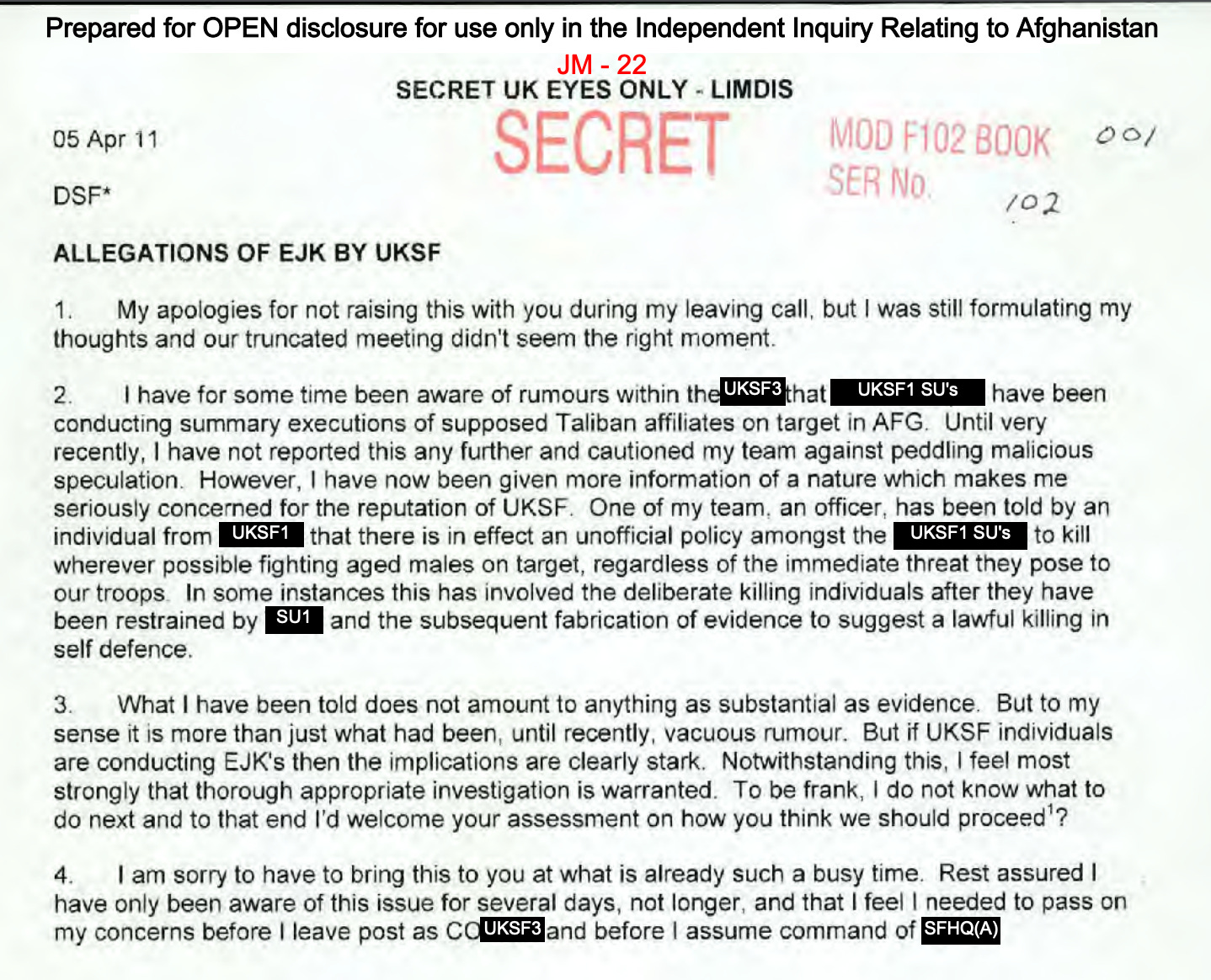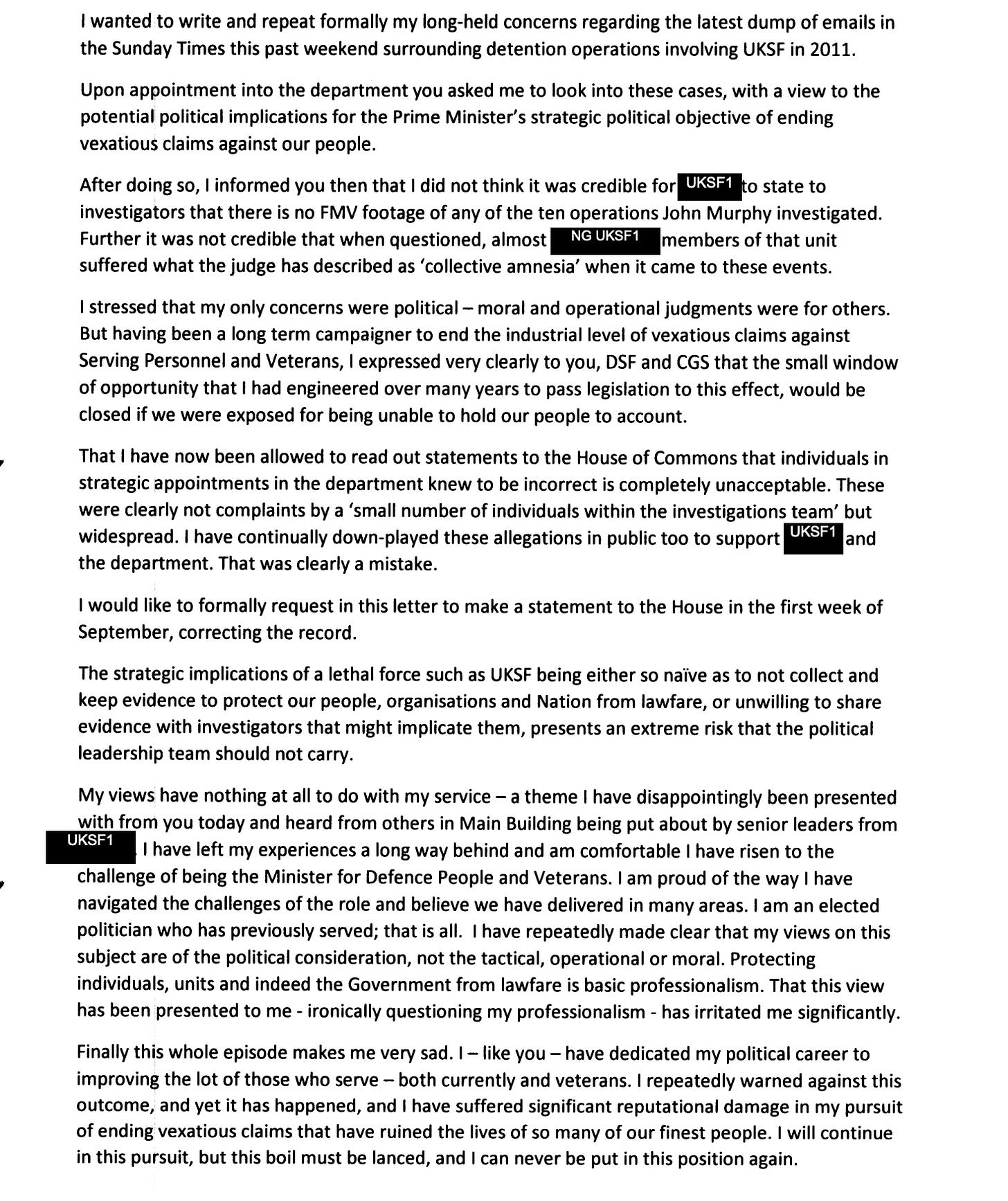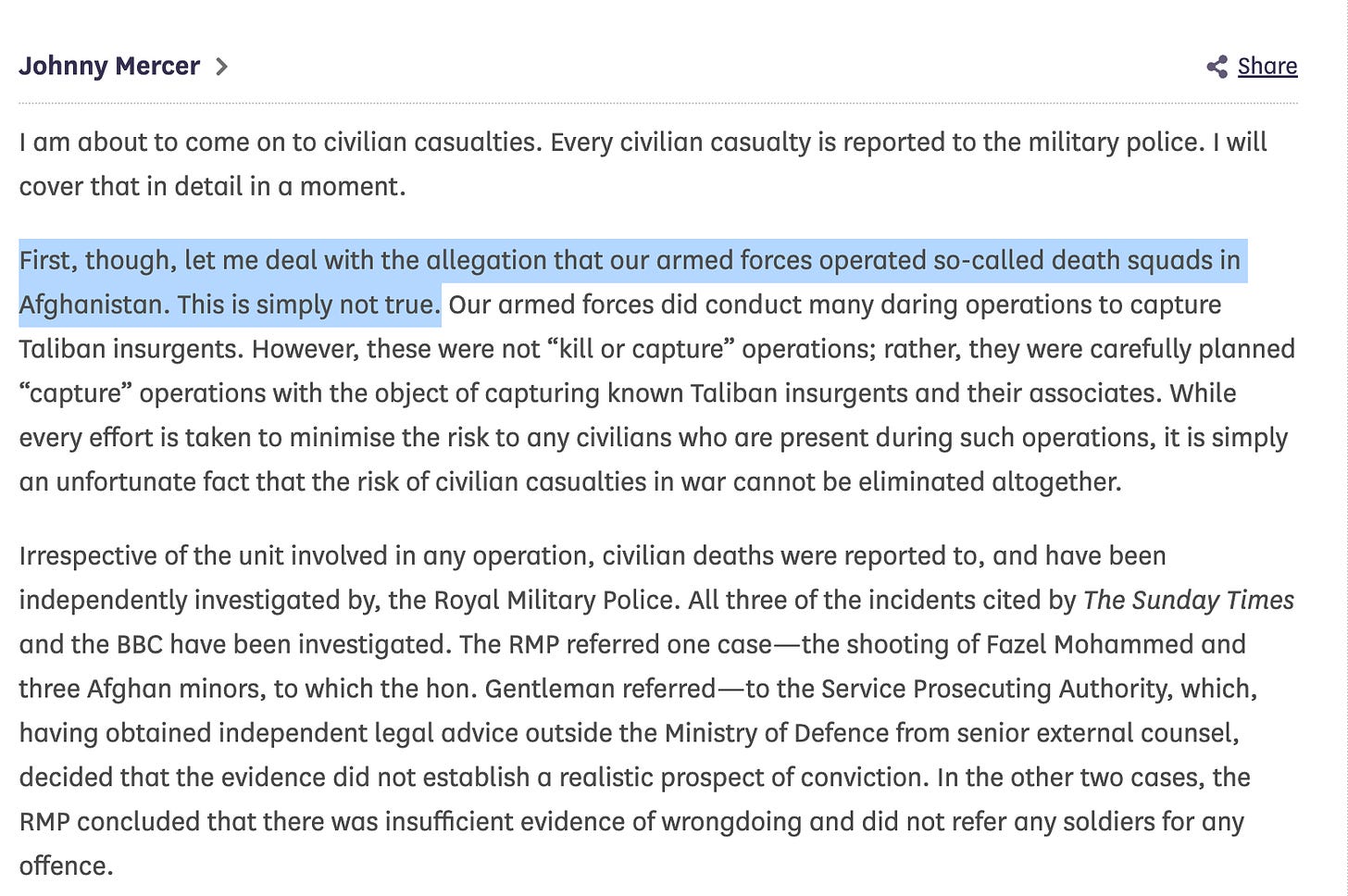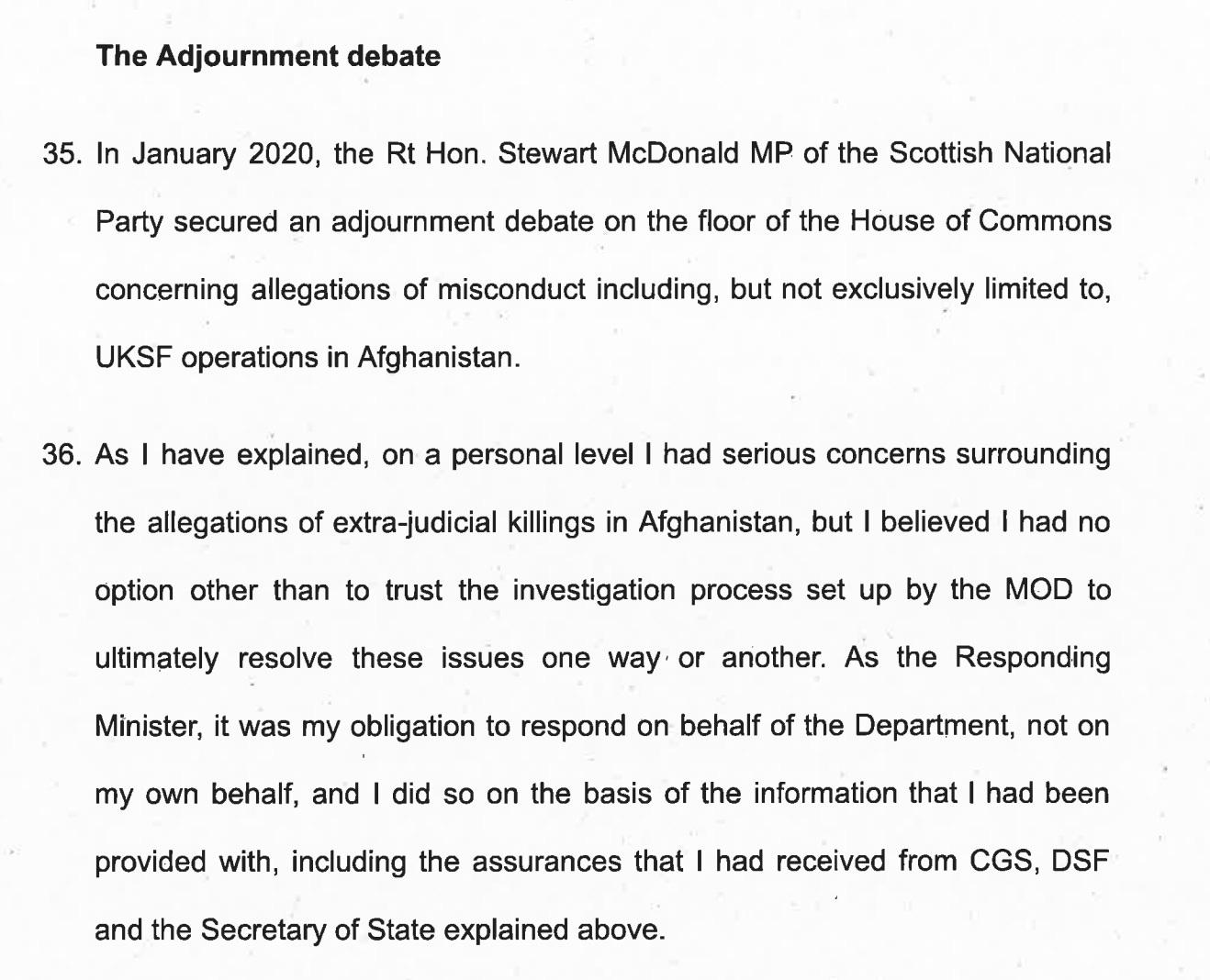Unpacking the remarkable witness statement of Johnny Mercer
A closer look at the extraordinary evidence put before the Afghan war crimes inquiry
Over at Prospect I have written a piece on the remarkable witness statement of Johnny Mercer MP given to the current Afghan war crimes inquiry.
But before you read that commentary, however, please read the following original documents.
*
First: a typed memorandum, dated 5th April 2011, from a commander of a UK special forces unit to the director of UK special forces. This is perhaps the most important publicly disclosed document to the inquiryso far.
It is hard to over-emphasise the importance of this 2011 memorandum. This Substack will setting out the significance of the 2011 memorandum shortly.
But in essence, there were grounds for serious concerns of a field commander that UK special forces were killing detained individuals and then fabricating evidence that the killings were lawful - and that there was, at a senior level, a call for a thorough investigation.
*
The second document to look at is undated but we know from oral evidence from the inquiry it is from August 2020. It is a letter from Mercer - then a junior minister - to Ben Wallace, the secretary of state for defence.
The gist of the letter is that Mercer is unhappy with what he is being told within the department about the available evidence of war crimes by UK special forces in Afghanistan, and that he is also unhappy with what he is being expected to say to the House of Commons.
*
It is a sensible rule - if you have the time and inclination - to read the original documents referred to in a witness statement before reading a witness statement itself. This is because a witness statement is often a framing device for the presentation of original documents and other evidence which a witness knows a court will also see.
A witness may have an interest in presenting an original document in a certain way, and so it can be wise to have had your own independent reading of the document.
The art of commentary is too often the putting (and pulling) of carts before horses: you are telling people what to think about things of which they usually have no direct information.
But when following the work of an inquiry (or a tribunal or court) it is prudent if you can to be evidence-led, and thanks to the impressive inquiry website we can read some of the key documents and witness evidence for ourselves.
*
Third, and once you have got a sense of the 2011 memorandum and the August 2020 letter then click on and read the Mercer witness statement itself.
Take your time.
Read and digest the statement.
Re-read it.
You will not regret this, for it is an extraordinary tale, well-told.
It is a witness statement for the ages.
*
My Prospect commentary on the Mercer witness statement is here.
In summary: the witness statement is remarkable, but it also should not be taken at face value.
As one tweeter put it: the witness statement is both revelatory and self-serving.
*
Since writing the Prospect piece, I think there are a some further observations that are perhaps worth sharing.
So here I will further unpack the statement.
*
First, if you look carefully at the witness statement, you will notice that the only parts of it which were formally compelled by the Inquiry’s request for evidence are on pages 16 to 19 of what is a 19-page document.
This means the sterling narrative of the bulk of the document was, in effect, volunteered. Mercer is making sure his version of events is being provided, and on his terms.
*
Second, the witness statement more-or-less frames at least four items of evidence to which the Inquiry would have independent access:
(a) the 2011 memorandum (above) and that Mercer was aware of it - and why he did not have a copy of it. Here we have the plausible secret-squirrel melodrama of a MoD official giving the minister the document and taking it away again:
(b) the other documents held by the MoD (and now before the inquiry) which had not been provided to Mercer:
(c) what was said by Mercer to parliament in the House of Commons adjournment debate of January 2020, and in particular this passage (emphasis added):
Compare this with what Mercer told Wallace in the August 2020 letter, where he says incorrect information was put by him before the House of Commons which requires formal correction:
And also with what he now says in his witness statement, about why he provided that incorrect information to the House of Commons:
(d) the circumstances of the August 2020 letter from Mercer to Wallace (above) - and what happened (and did not happen) and what he did (and what he did not do) following that letter:
Note here that Mercer states explicitly that he - as a defence minister - did not believe the chief of general staff (CGS) and the director of special forces (DSF) about whether these claims had been investigated.
(There will also be documents available to the inquiry in respect of the attempts by Mercer to investigate the matter - and the responses (and lack of responses) of officials and officers to Mercer’s enquiries.)
*
In summary, the Mercer witness statement frames the following evidence and information also available to the Inquiry:
how he knew that serious allegations warranting a thorough investigation were made at a high level (the 2011 memorandum);
that he became aware of other key documents which were withheld from him (the documents obtained by Panorama and the Sunday Times);
how he (in this own view) provided incorrect information to the House of Commons which needed to be corrected (the January 2020 adjournment debate); and
how he ultimately did nothing about this, other than write an internal letter to the Secretary of State (the August 2020 letter).
*
One striking point to also come out of reading the Mercer witness statement is that claimant lawyers were far more successful in obtaining incriminating documents out of the Ministry of Defence than one of its own ministers seeking that same information internally.
As such, the Mercer evidence rather undermines the concept of the ‘political constitution’ - where we are supposed to rely on officials providing good information to ministers, and on ministers in turn providing that good information when pressed in parliament, rather than it being a matter for courts and judicial review. The January 2020 adjournment debate, at a stroke, is especially telling in this regard.
*
Mercer is to be commended for volunteering the additional information in his witness statement. He could have just given guarded answers to the formal requests, and he chose not to do so. It is also plain that Mercer is justifiably angry at the obstructions and lack of answers he got as a minister in his own department. For him to place all this information before the inquiry, and thereby into the public domain, is a boon for the public understanding of government.
And as a piece of prose, the witness statement - which has many refreshing signs of not being fully written or finalised by lawyers - is an impressive literary document, and quite the thing to read.
But the claps and cheers for Mercer should not go too far.
Left to himself, there would not be this inquiry - and indeed he expressly warns Wallace in the August 2020 letter of the prospect of such an inquiry. Indeed, left to himself queries from the media and from those affected by these allegations would still be referred to the MoD - the very MoD that would not give answers to one of its own ministers.
Left to himself we would not know that there were concerns at a senior level that there were numerous extra-judicial killings by UK special forces in Afghanistan and fabricated evidence to cover those killings up.
And left to himself, parliament would be (as he himself puts it) misled by incorrect information.
And left to himself the courts would be stymied in holding the armed forces to account in such civil and criminal matters by the very legislation he himself promoted.














No wonder the political leadership of the MOD are all running for cover.